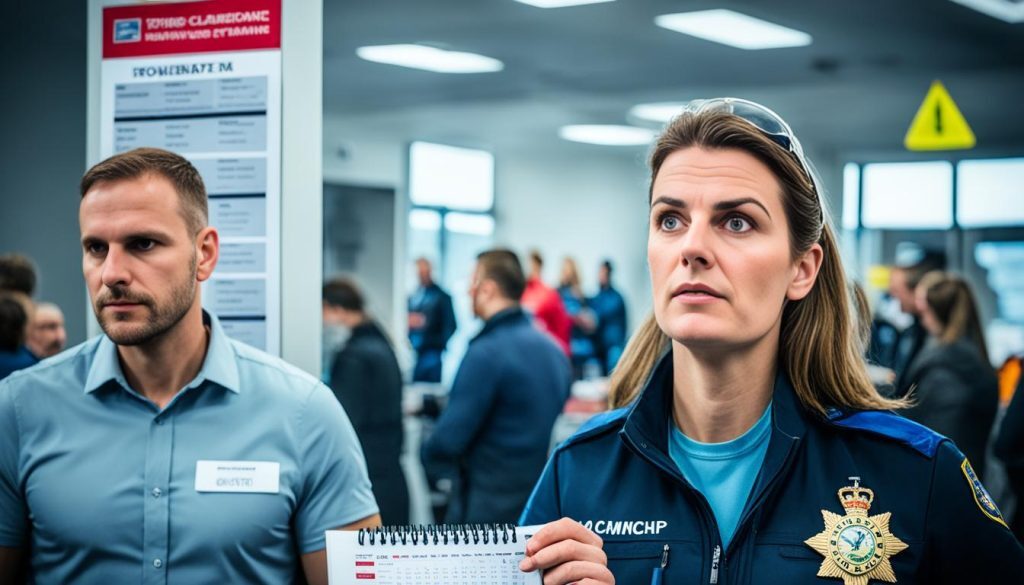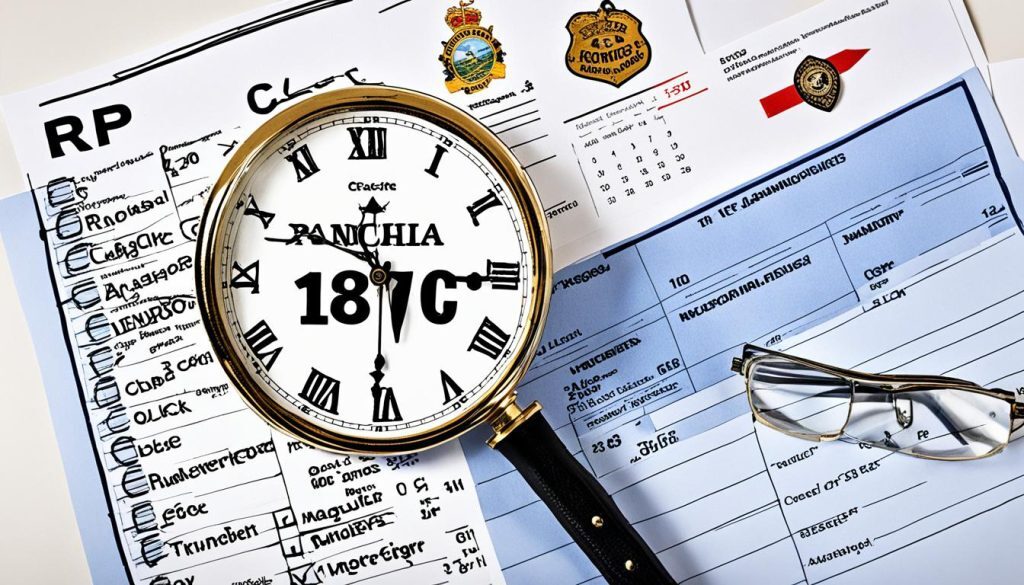Did you know that the application process for the Royal Canadian Mounted Police (RCMP) takes approximately 6-8 months to complete? That’s right, if you’re considering a career with the RCMP, it’s important to understand the timeline and duration involved.
Getting through the RCMP application process requires time, patience, and commitment. From the initial application to the final background check, each step plays a crucial role in determining your eligibility and suitability for a career with the RCMP.
Key Takeaways:
- The RCMP application process takes approximately 6-8 months to complete.
- Full-time positions are available, with no casual or part-time options.
- Shift work is a requirement, with shifts lasting between 8-12 hours.
- Training is provided, including classroom and on-the-job training with a field coach.
- The basic requirements include a Canadian high school diploma, Canadian citizenship or permanent residency, and good character.
Application Process Timeline
Interested in joining the Royal Canadian Mounted Police (RCMP)? Let’s take a closer look at the RCMP application process, from start to finish.
The application process for the RCMP typically takes around 6-8 months to complete. This includes the submission of your application and the subsequent security investigation that follows. The timeline may vary depending on the volume of applications received and the level of manual processing required.
Once you’ve submitted your application, the RCMP will initiate a comprehensive security investigation. This investigation can take approximately 3-4 months to complete. The exact duration depends on factors such as the completeness of the provided information and the need for any clarifications.
During the investigation period, the RCMP will conduct thorough background checks and assessments to ensure you meet the necessary requirements. This includes reviewing your criminal record, verifying your references, and assessing your suitability for a career with the RCMP.

The RCMP processing time may be longer if there is a high volume of applications or if any additional information or documentation needs to be gathered. It’s important to be patient throughout the process and to promptly respond to any requests for further information.
While waiting for the application process to be completed, take the opportunity to prepare yourself mentally and physically for the challenges ahead. Familiarize yourself with the responsibilities and expectations of an RCMP officer, and ensure you are physically fit to meet the demands of the role.
Once your application and security investigation are completed, you will be notified of the outcome. Successful candidates will proceed to the next stages of the recruitment process, including further assessments and interviews.
Stay focused, stay positive, and stay committed to your goal of becoming an RCMP officer. The application process may be time-consuming, but it’s an important journey towards a rewarding and fulfilling career in law enforcement.
Background Check Duration
When applying for a position with the Royal Canadian Mounted Police (RCMP), one important aspect of the application process is the background check. The background check is conducted by the RCMP’s Canadian Criminal Real Time Identification Services (CCRTIS) to ensure the suitability of candidates for employment.
The duration of the background check can vary depending on several factors. If there is a possible match to a criminal record, the processing time can be approximately 120 business days. This includes any manual processing required and the clarification of application details with local police. It is essential to note that even electronic fingerprint submissions may require some manual processing, which can impact the overall processing time.
On the other hand, if there is no match to a criminal record, the results can be available in 3 business days or less. This expedited processing time provides a quicker resolution for candidates who do not have a criminal record.
| Processing Scenario | Duration |
|---|---|
| Possible criminal record match | Approximately 120 business days |
| No match to a criminal record | 3 business days or less |
The background check duration can also be influenced by additional factors such as the volume of applications received and the specific reasons for the application. It is important for candidates to be patient during the process and understand that thorough checks are necessary for ensuring public safety and the integrity of the RCMP.
For a more detailed overview of the RCMP application process and timelines, refer to the previous sections of this article. In the next section, we will explore the CritiCall exam and interview preparation, which are crucial steps in becoming an RCMP dispatcher.

CritiCall Exam and Interview Preparation
Preparing for the CritiCall exam and panel interview is essential to increase your chances of success in becoming an RCMP dispatcher. The CritiCall exam is an online entrance exam that evaluates your skills in various areas related to the role. It consists of eight modules, including keyboarding, data entry, multitasking, decision making, and reading comprehension.
To excel in the exam, it is important to practice and develop your skills in each module. Improve your keyboarding speed and accuracy by regularly practicing typing exercises. Enhance your data entry skills by practicing entering information accurately and efficiently. Develop your multitasking abilities by engaging in activities that require you to handle multiple tasks simultaneously. Sharpen your decision-making skills by practicing scenarios where quick and effective decisions are required. Strengthen your reading comprehension by reading and analyzing various texts.
After successfully completing the CritiCall exam, the next step is to prepare for the panel interview. The interview is an opportunity for you to showcase your abilities and suitability for the role of an RCMP dispatcher. To prepare effectively, it is recommended to refer to the Police Dispatcher Candidate Selection Guide provided by the RCMP. This guide offers valuable information on how to present yourself and your abilities during the interview. It provides guidance on structuring your responses and leveraging examples from past experiences to showcase your skills and qualifications.
During the interview, expect questions that assess your ability to handle high-pressure situations, communicate effectively, and make sound decisions. Be prepared to provide specific examples from your previous experiences that demonstrate your skills in these areas. Emphasize your problem-solving abilities, teamwork skills, and adaptability to different scenarios.
By thoroughly preparing for the CritiCall exam and the panel interview, you can position yourself as a strong candidate for the role of an RCMP dispatcher and increase your chances of success.
Tips for CritiCall Exam and Interview Preparation:
- Practice keyboarding exercises regularly to improve speed and accuracy.
- Enhance your data entry skills through accurate and efficient information input.
- Engage in activities that require multitasking to develop your abilities in handling multiple tasks simultaneously.
- Practice decision-making in scenarios that require quick and effective choices.
- Read and analyze various texts to strengthen your reading comprehension skills.
- Refer to the Police Dispatcher Candidate Selection Guide for guidance on interview preparation.
- Showcase your problem-solving, teamwork, and adaptability skills during the interview.
- Provide specific examples from your past experiences to demonstrate your qualifications.
- Highlight your ability to handle high-pressure situations and make sound decisions.
| CritiCall Exam Modules | Description |
|---|---|
| Keyboarding | Evaluates your typing speed and accuracy. |
| Data Entry | Tests your ability to enter information accurately and efficiently. |
| Multitasking | Assesses your capability to handle multiple tasks simultaneously. |
| Decision Making | Evaluates your ability to make prompt and effective decisions. |
| Reading Comprehension | Tests your understanding and interpretation of written information. |
Training and Work Schedule
As a 911 dispatcher for the RCMP, I have undergone comprehensive training to ensure I am prepared for the challenges and responsibilities of the job. The training program consists of both classroom instruction and on-the-job training with a field coach.
In the classroom, I completed 5 weeks of training for call taking, where I learned essential skills such as effective communication, active listening, and gathering critical information from emergency callers. Following that, I received an additional 2 weeks of classroom training specifically for dispatching, focusing on coordinating emergency response teams and making quick and accurate decisions under pressure.
Once the classroom training was complete, I was paired up with a field coach who provided me with 300 hours of on-the-job training. During this time, I had the opportunity to apply the knowledge and skills I learned in the classroom to real-life emergency situations. Working closely with a seasoned dispatcher allowed me to gain valuable experience and refine my abilities in call taking and dispatching.
As a full-time RCMP dispatcher, my work schedule revolves around variable shifts. I am scheduled to work a total of 300 hours over an eight-week period. The shifts can range from 8 to 12 hours in duration, depending on the operational needs of the RCMP. The work schedule is posted 28 days in advance, allowing me to plan for my shifts and maintain a healthy work-life balance.
Overall, the combination of comprehensive training and a flexible work schedule allows me to effectively fulfill my role as an RCMP dispatcher and provide vital support to the community.
Fees and Vacation Time
When it comes to the RCMP application process, it’s important to consider the fees involved. For a certified criminal record check (fingerprint-based), there may be both local and federal processing fees. The local fees are determined by the local police agency or accredited fingerprinting agency you choose to work with. On the other hand, the federal processing fee is typically CDN$ 25 for each criminal record check. However, it’s worth noting that in certain cases, such as for residential school survivors and their descendants reclaiming their Indigenous names, the federal processing fee may be waived.
As an RCMP employee, you’ll also be entitled to vacation time. Vacation time is earned on a monthly basis at a rate of 9.375 hours, allowing for approximately 10 days of vacation per year. This means that over the course of the year, you’ll be able to accumulate enough vacation leave credits to enjoy a well-deserved break. Additionally, it’s worth mentioning that the number of vacation leave credits you earn per month increases with years of service, providing you with even more opportunities to rest, recharge, and spend quality time with loved ones.
At the RCMP, we understand the importance of work-life balance and strive to provide our employees with the time they need to relax and rejuvenate. Whether it’s exploring the great outdoors, spending time with family and friends, or pursuing personal interests, we believe that taking time off is essential for overall well-being. So, rest assured that as an RCMP employee, you’ll have the chance to enjoy some well-deserved vacation time throughout the year.